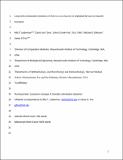Long-Term Colonization Dynamics ofEnterococcus faecalisin Implanted Devices in Research Macaques
Author(s)
Lieberman, Mia; Van Tyne, Daria; Dzink-Fox, JoAnn; Ma, Eric J.; Gilmore, Michael S.; Fox, James G; ... Show more Show less
DownloadAccepted version (916.0Kb)
Terms of use
Metadata
Show full item recordAbstract
Enterococcus faecalis is a common opportunistic pathogen that colonizes cephalic recording chambers (CRCs) of macaques used in cognitive neuroscience research. We previously characterized 15 E. faecalis strains isolated from macaques at the Massachusetts Institute of Technology (MIT) in 2011. The goal of this study was to examine how a 2014 protocol change prohibiting the use of antimicrobials within CRCs affected colonizing E. faecalis strains. We collected 20 E. faecalis isolates from 10 macaques between 2013 and 2017 for comparison to 4 isolates previously characterized in 2011 with respect to the sequence type (ST) distribution, antimicrobial resistance, biofilm formation, and changes in genes that might confer a survival advantage. ST4 and ST55 were predominant among the isolates characterized in 2011, whereas the less antimicrobial-resistant lineage ST48 emerged to dominance after 2013. Two macaques remained colonized by ST4 and ST55 strains for 5 and 4 years, respectively. While the antimicrobial resistance and virulence factors identified in these ST4 and ST55 strains remained relatively stable, we detected an increase in biofilm formation ability over time in both isolates. We also found that ST48 strains were typically robust biofilm formers, which could explain why this ST increased in prevalence. Finally, we identified mutations in the DNA mismatch repair genes mutS and mutL in separate ST55 and ST4 strains and confirmed that strains bearing these mutations displayed a hypermutator phenotype. The presence of a hypermutator phenotype may complicate future antimicrobial treatment for clinically relevant E. faecalis infections in macaques.
Date issued
2018-07Department
Massachusetts Institute of Technology. Division of Comparative Medicine; Massachusetts Institute of Technology. Department of Biological EngineeringJournal
Applied and Environmental Microbiology
Publisher
American Society for Microbiology
Citation
Lieberman, Mia T. et al. "Long-Term Colonization Dynamics of Enterococcus faecalis in Implanted Devices in Research Macaques." Applied and Environmental Microbiology 84, 18 (July 2018): e01336-18 © 2018 American Society for Microbiology
Version: Author's final manuscript
ISSN
0099-2240
1098-5336